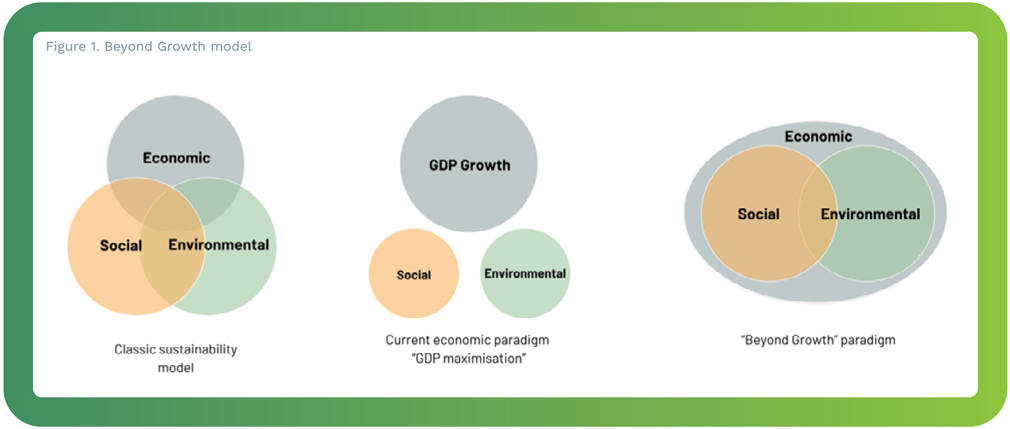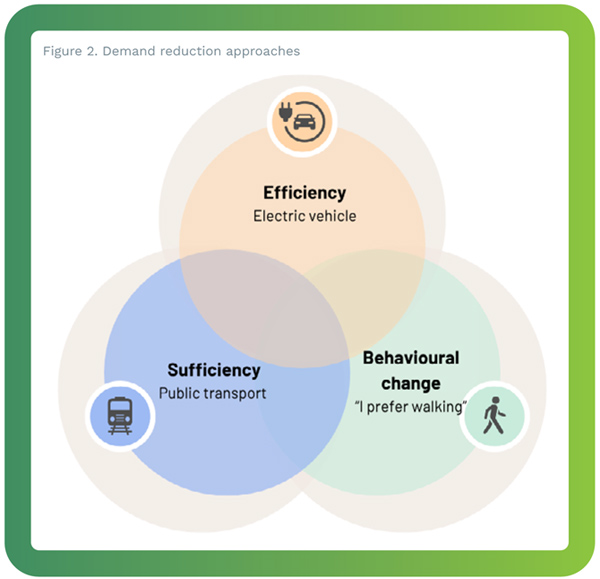 It is broadly accepted that economic growth has brought widespread prosperity in the post- World War II era, reducing poverty and allowing progressive public policies in most Western countries. However, progressively, the neoliberal central emphasis on economic growth has revealed its deep social and environmental consequences, compromising the two other dimensions of sustainability in its traditional definition(1).
It is broadly accepted that economic growth has brought widespread prosperity in the post- World War II era, reducing poverty and allowing progressive public policies in most Western countries. However, progressively, the neoliberal central emphasis on economic growth has revealed its deep social and environmental consequences, compromising the two other dimensions of sustainability in its traditional definition(1).
The mainstream argument suggesting that economic growth is a prerequisite to improving social welfare might, in fact, only hold true within certain boundary conditions.
From a social perspective, it is plagued with myopia, largely neglecting the adverse social effects induced in other parts of the world. In addition, it implicitely assumes the existence of an efficient and fully functional wealth redistribution framework.
From an environmental standpoint, the detrimental effects of economic growth have been long overlooked until recently, when it has become impossible to externalise further its impacts beyond our field of vision.
The current global economic paradigm has remarkably invalidated both these boundary conditions. By erecting the pursuit of economic growth and profit at the core of its model, it has fully globalised the economy while at the same time broadly deconstructed the post-war redistribution frameworks of the socalled "Welfare State".
The consequences are staggering.
In most developed economies, a trend towards greater social inequalities, an unprecedented concentration of wealth, alongside with increasing poverty levels is unfolding, leading to widespread social discontent, growing distrust in democracies, and the rise of populist voices.
Last year, the global average temperature was 1.26°C higher than that of pre-industrial levels(2), and a very recent study established that 2023 has seen for the first time 6 out of 9 planetary boundaries being transgressed, with pressure increasing on all of them(3). There is a rather strong case that the continuous pursuit of economic growth is colliding with the planet's boundaries and renders a sustainable climate trajectory increasingly unattainable.
In the words of UN Secretary General Mr. A. Guterres, "the Era of global boiling has arrived". Continuing along this course is inexorably leading us to an announced soon-to-come chaos. And there is little hope that Sultan al Jaber, CEO of Abu Dhabi National Oil Company and, incidentally, President of the upcoming COP28, will reverse this course.
The time for discontinuous thinking has arrived. We need to design a transformative model able to generate social welfare while remaining compatible with planetary boundaries.
We need to recognise the very physical dimension of the current economic paradigm and disconnect economic sustainability from the dogma of economic growth.
This finding, dating back over half a century, was initially developed in "The Limits to Growth", a report published in 1972(4). Few of us remember that it profoundly inspired the European Commission's 4th President, Mr. Sicco Mansholt, who then attempted to redesign the economic paradigm of the bloc in a fundamental way. History tells us his aspirations were not followed through.
This debate, for long inaudible for mainstream economists and politicians, is suddenly re-emerging with an acute sense of urgency(5). A range of positions exists in the growth debate. Most moderate positions advocate for "Green Growth", which fundamentally tables on adjustments and/or additions to the current economic paradigm to make it compatible with social and environmental sustainability.
Proponents of "Degrowth" put forward instead a radical and opposite vision, arguing that growth itself is the issue, colliding with the limited regenerative capacities of the earth system and being the root cause of growing social inequalities.
Supporters of "Beyond Growth" or "Post Growth" theories are essentially agnostic about using growth as a central policy objective but suggest concentrating on rethinking the nature of economic activity to reach the multidimensional goals of social and environmental sustainability.
Embracing the latter, which suggests a more open and mission-driven approach, and focusing on addressing the climate emergency, underscores the necessity to break the status quo to avoid short-term climate chaos.

 We have a finite environment – the planet. Anyone who thinks that you can have infinite growth in a finite environment is either a madman or an economist.
We have a finite environment – the planet. Anyone who thinks that you can have infinite growth in a finite environment is either a madman or an economist.
– Sir David Attenborough
Science indisputably tells us that our 1.5°C carbon budget will be exhausted in just a few years (2). Global emissions are still on the rise, and the world is on track to largely overshoot the upper 2°C limit. This trajectory is believed to trigger several tipping points that would irreversibly propel human society into an unpredictable future.
In contrast, even the prudent IEA analysis, suggesting that fossil fuel demand might peak during this decade, is being put in jeopardy by the unfolding economic and geopolitical context. Backlashes as already recently witnessed in countries such as the UK and Germany, and the growing pushback against U. von der Leyen's progressive Green Deal agenda could indeed easily further extend the reign of fossil fuels. A chasm exists between the observed historical rates of carbon abatements, the foreseeable technology improvements, and the required rate of emission reductions to be achieved year on year up to 2050.
Considering decarbonisation of the supply side of the economy appears arguably too slow, reason compels us to now consider seriously addressing the demand side as well.
Since the 70's oil crises, demand reduction policies - with the notable exception of efficiency measures - were mostly banned from the policy discourse as essentially colliding with the very principle of economic growth.
However, the full-scale Russian war on Ukraine and the consequential energy crisis have suddenly revived the debate, with demand reduction being remarkably included as an integral part of Europe's REPowerEU policy response. But while it has been mostly seen as crisis-related, i.e., "a temporary short-term fix", the time has come to structurally integrate long-term demand reduction strategies into the core of the Clean Energy Transition policymaking.
Energy demand reduction strategies can broadly be conceptualised as a set of distinct yet complementary approaches, including:
 Energy efficiency: Reducing the energy input per unit of energy service output. Efficiency essentially provides an energy reduction relative to the desired energy service but does not guarantee, by itself, an absolute reduction of energy demand. It consists of increasing energy productivity and is essentially achieved through technological improvements. Examples include reducing space heating energy consumption in a building by better insulating its envelope or replacing electrical convection heaters with heat pumps.
Energy efficiency: Reducing the energy input per unit of energy service output. Efficiency essentially provides an energy reduction relative to the desired energy service but does not guarantee, by itself, an absolute reduction of energy demand. It consists of increasing energy productivity and is essentially achieved through technological improvements. Examples include reducing space heating energy consumption in a building by better insulating its envelope or replacing electrical convection heaters with heat pumps.
Energy sufficiency: Reducing the aggregated absolute energy use by decreasing or avoiding energy services needs. This is essentially about reconsidering the amount of production and consumption necessary to ensure a satisfactory level of well-being. Examples include reducing the nominal temperature setting in living or working spaces or using a staircase instead of an elevator.
Behavioural change: Referring to both individual-level (e.g., households) and/ or collective (e.g., community-wide) changes in behaviour and decision patterns intended to effectively reduce the aggregated energy consumption. It mainly relates to individual or collective shifts towards sufficiency and/or efficiency measures. Opting for public transport rather than individual cars, avoiding air travel by changing holiday destinations, or refraining from using air conditioning whenever possible are examples of behavioural changes leading to energy sufficiency or energy efficiency gains. Behavioural change has an essential cultural and societal dimension as it often relates to changing prevailing societal values and practices. Although it often represents a substantial aggregated demand reduction potential, it usually entails longer time cycles.
The European Energy Research Alliance (EERA) catalyses scientific research for achieving the clean energy transition across more than 200 leading research organisations within 30 European countries. It provides leading-edge research on low-carbon technologies and on the socio-economic conditions required for the EU to achieve its long-term objectives of climate neutrality. The EERA scientific community has been calling for a holistic approach, leveraging best-in-class technology progress in combination with socioeconomic research to drive the Clean Energy Transition(6).
Building on this work, EERA will present its flagship report on energy demand reduction at the occasion of its annual high-level policy conference, "Researching energy pathways to a resilient and net-zero society". The event will take place in person in Brussels and will also be broadcast online. Registrations are open here.